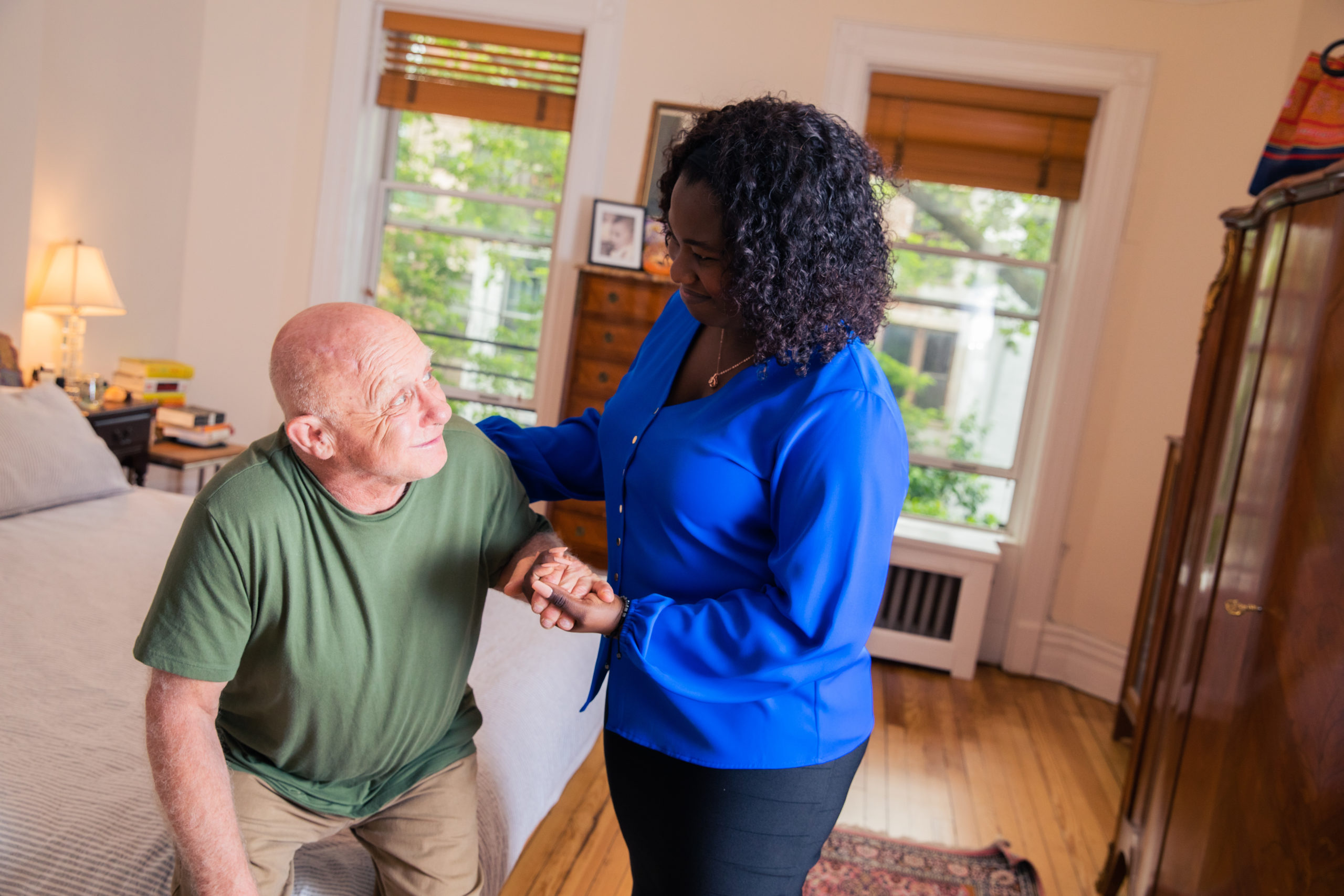Assembling a care team for a loved one can feel overwhelming. The good news is that there are many professionals who can play a valuable role in the long-term care process. But first, you need to know who they are and what they can provide.
It’s important to understand that no two care stories are the same. Some begin when an emergency strikes – like a serious illness, hospitalization, or a fall. Other times, you may see common signs that support is going to be necessary, and thus begin to plan in advance.
Signs that in-home support is necessary may include:

Geriatric Care Managers (GCMs) are usually licensed social workers or nurses who specialize in supporting adults with age-related or chronic conditions. Consider a GCM like a personal consultant or even a “concierge” who assists families in identifying needs and finding resources to meet those needs effectively.
A GCM can be incredibly helpful in instances where family members and other social supports do not live proximally to their loved one in need, or when an emergency arises and you need answers right away. A GCM’s support tasks include, but are not limited to:
If you are interested in learning more about Geriatric Care Managers, one very helpful resource is the Aging Life Care Association (ALCA), a nationwide association that supports hundreds of well-qualified care managers. The ALCA Directory can help you identify care managers near you or your loved one.
Another important resource for families doing advance planning is an experienced Elder Law Attorney. Elder Law Attorneys specialize in the legal aspects of aging and its accompanying concerns. This may include:
So many of our challenges are unforeseen, and therefore advance planning with an attorney can prove critical. That might mean providing trusted family members or friends with future decision-making capabilities, or defining beneficiaries in wills or trusts. In New York, it may also be helpful to consult with an attorney about Medicaid planning if you are concerned about funding for care services.
Who pays for GCMs and elder care attorneys? Many elder law attorneys make themselves available for free or low-cost consultations and will provide services for a flat fee (without requiring a client to retain them for long term legal counsel). The services of Geriatric Care Managers are primarily private pay – and while the cost for care management services can appear expensive on an hourly basis, our experience has shown that good care managers can end up saving families an extraordinary amount of time & effort when compared to finding help on their own.

Because individual needs vary so widely, good in-home care services should be highly tailored to each person or family. It would be a mistake to assume that all “home care” companies provide the same services.
For some, in-home care begins with a sociable and engaging companion. Companions may start with visits 1-2 times per week, helping with necessary weekly chores and providing authentic companionship. Our most successful client/companion relationships are built on meaningful conversations about shared interests and current events, creativity, and/or taking trips to cultural and entertainment venues around the city.
For those facing the challenges of Alzheimer’s disease or other forms of dementia, special care should be provided: a caregiver or companion should be trained in methods that mitigate communication and behavioral challenges that arise from memory loss, confusion, and other symptoms of dementia.
For older adults who require hands-on support for personal care tasks (e.g. bathing, dressing, wheelchair transfers), a certified home health aide (HHA) who adheres to a care plan may be the most appropriate caregiver.
In addition to these companion or HHA services, some older adults require skilled nursing care. Skilled nursing care is most commonly provided by Licensed Practical Nurses (LPNs) or Registered Nurses (RNs) who provide medical services, such as wound care or injections.
Who pays for in-home caregiver services? For many Americans, in-home care services will need to be paid for privately, i.e. with your own funds or savings. One alternative to paying for services when the need arises is to purchase a long-term care insurance policy. These policies can be purchased on their own or in conjunction with broader life insurance policies, and they commonly provide coverage for in-home care costs along with community-living and skilled nursing care.
Individuals who are paying privately for home care should be discerning about the quality of care they receive, as they retain full control over the providers they choose, and should seek to personalize their care services to the fullest extent possible.
What about Medicare and Medicaid?
Medicare generally covers healthcare services for adults over the age of 65 and is offered through Federal funds. Most often, Medicare covers in-home care services following a patient’s discharge from a hospital or rehabilitation facility. These services, such as skilled nursing, physical therapy, or even HHA services, are only covered for a finite period of time – a typical episode of in-home care covered by Medicare is 60 days, and may not cover all of the services or hours of care needed.
Medicaid provides healthcare coverage for individuals with lower income levels; it is offered through a combination of Federal and State funding. Coverage of in-home care services by Medicaid is more complicated and will vary significantly by state.
In New York, older adults who qualify for Medicaid are often able to receive in-home care services from home health aides (HHAs) on an ongoing basis. Individuals must be evaluated to determine their needs and the amount of service they will receive (i.e. for several hours per week or as much as 24/7 care).
To best understand coverage provided by the Medicaid home care system in New York, we recommend seeking the counsel of a trusted advisor or elder law attorney.
For many, a visiting primary care physician (PCP) or other primary care provider (e.g. nurse practitioner) is the linchpin of a home-based care team. These providers can help alleviate the stress and logistical concerns around important medical appointments as your loved one ages in place. As with any primary care provider, they can diagnose and treat myriad illnesses, and make important referrals to other specialists.
From our experience supporting seniors in New York City, we have seen visiting primary care providers generally fall into one of several categories:

Each type of provider can have its advantages, and we recommend that you speak with a trusted medical advisor or a professional familiar with in-home medical care in the city.
Additional providers: In addition to primary care, there are a plethora of visiting specialists who can bolster the care team. Some of the common visiting providers include podiatrists, dentists, mental health professionals, audiologists, and optometrists.
Pharmacists: Did you know that many local pharmacies will pre-package and deliver medications? For those with increasing needs, consider a specialized pharmacy service that packages medications in easy-to-open blister packs. This convenience can help reduce potential confusion regarding medication administration.
Physical and occupational therapy: if the senior in your life is experiencing changes in balance, endurance and/or strength, home-based PT and OT can enhance confidence and safety while aging in place.
Who pays for visiting providers’ services? The good news is that many visiting primary care providers and specialists are able to accept Medicare and other health insurance. And while physical and occupational therapy services are often covered under Medicare’s home care benefit following an inpatient stay, they can often be at least partially covered by Medicare on an ongoing basis. Be sure to ask your provider about their insurance coverages – most of them will let you know upfront about their payment options. A number of private physicians and specialists will only accept private payment.
***
We acknowledge how significant the emotional and psychological aspects of caring for an aging loved one can be. We’re here to support you every step of the way. We hope this introduction has empowered you to begin making choices for your family’s care journey. Please don’t hesitate to call us at 212-256-1933 or complete our Contact Form to ask questions and start building a care team unique to your or your loved one’s needs.